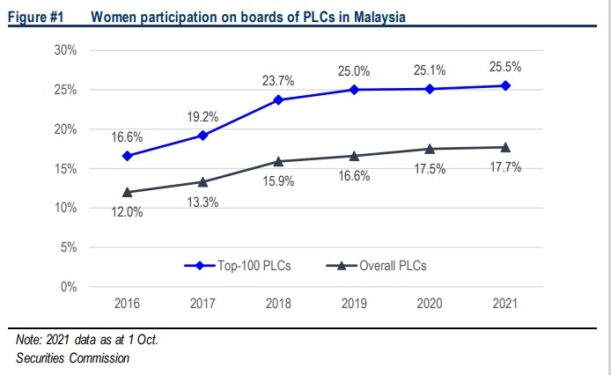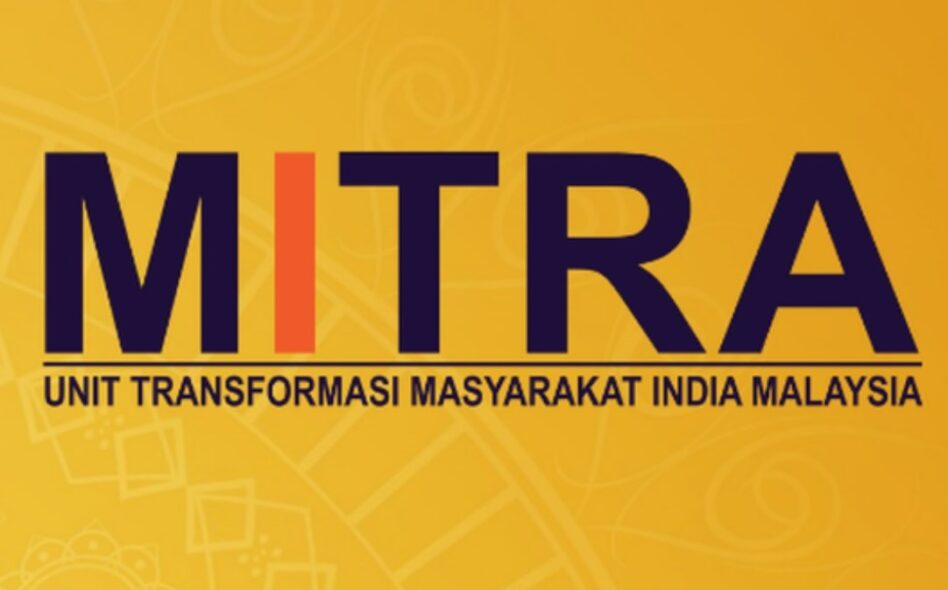Editor’s Note: The use of the word “pathetic” on the headline reflects the editorial stance of FocusM and not HLIB Research. Also, we have amended two typos, namely “39.8%” on Paragraph 11 and “95.8” on Paragraph 13. We wish to thank HLIB Research for pointing up the discrepancies.
POSITIVELY, women participation on boards of public listed companies (PLCs) has shown decent improvement over the past decade by rising from 7.7% to 17.7% by 2021.
Nevertheless, Hong Leong Investment Bank (HLIB) Research observed that the rate of increase has diminished over the past three years, plateauing at 16.6%–17.7% between 2019 and 2021.
“While female representation on boards of the top-100 PLCs is higher when stacked against overall PLCs on Bursa Malaysia, its pace of increase has also flattened in recent years (2019-2021: 25%-25.5%),” observed head of research Jeremy Goh and team in a strategy note.
“In addition, only 162 PLCs (18%) have achieved the 30% target for female board representation and there are still 252 PLCs (27%) that have all-male boards.”

Such outcome is not encouraging given that the Government via the Securities Commission (SC) is making it mandatory for all Bursa Malaysia-listed companied to have at least one female director in the near future.
This initiative will take effect from Sept 1 for large cap companies (market cap >RM2 bil) and from June 1, 2023 for the remaining PLCs (public listed companies).
Subsequent to Budget 2022, the SC had on 24 Nov 2021 issued its Corporate Governance Strategic Priorities 2021-2023 report hereby under strategic initiative 1.3, the market regulator will pursue the establishment of a public-private partnership (PPP) to accelerate progress in achieving the 30% target.
A 2021 study by the Institute of Corporate Directors Malaysia (ICDM) and WillisTowersWatson (WTW) covering 312 PLCs on Bursa showed that boards with at least one-third women representation correlates with 38% higher median ROE (return on equity) than boards with no women.
According to HLIB Research, a gender diversity analysis of its coverage universe based on the annual reports of 118 counters up to July 29 reveals the following:
- Female board representation: There were a total of 1,027 directors (alternate directors were excluded), of which 261 were women, representing a participation rate of 25.4%. Compared to the data disclosed by SC, female board representation rate of HLIB Research’s coverage is similar with the top-100 PLCs (25.5%) but above vs overall PLCs (17.7%).
- 30% target: 39.8% of PLCs under HLIB Research’s radar met or exceeded the “30% target” while 60.2% did not. PLCs with the highest female board participation rate are KLCC REIT (55.6%), Digi.Com Bhd (50%), Malaysia Airports Holdings Bhdd (45.5%), Dialog Group Bhd and Panasonic Manufacturing Malaysia Bhd (both at 44.4%), Gamuda Bhd, Sunway REIT, Heineken Malaysia Bhd, Focus Point Holdings Bhd, MR DIY Group (M) Bhd, Nestle (M) Bhd and Mah Sing Group Bhd (all seven at 42.9%).
Sectors that had more than half of the PLCs meeting the 30% target were banking, consumer, gloves, media, property, telco and utilities.
- At least one female director: 95.8% of HLIB Research’s coverage have “at least one female director” – indicating that they are ready for the said ruling that will take effect on Sept 1 for large cap companies) and June 1, 2023 (for the rest).
There are only five companies in the research house’s coverage (4.2%) that do not have any female director – HIL Industries Bhd, Hiap Teck Venture Bhd Sapura Energy Bhd, Wah Seong Corp Bhd and Lii Hen Industries Bhd.
“However, all these five companies have a market cap of <RM2 bil, hence the ruling of “at least one female director” will only apply to them from June 1, 2023 onwards,” noted HLIB Research.
“This offers sufficient time to ensure compliance by the due date.”
On a less progressive note, HLIB Research also observed that both the chairman and CEO/managing director (MD) position remains very much male-dominated.
“Only 5.1% of PLCs within our coverage had women for the chairman role – Mah Sing, Press Metal Aluminium Holdings Bhd, Time dotCom Bhd, TRC Synergy Bhd, Kobay Technology Bhd and Inari Amerton Bhd,” revealed the research house.
“For the CEO/MD position, there were only three females (2.5% of coverage) holding the top executive position – Sentral REIT, Axis REIT and Sports Toto Bhd.” – Aug 8, 2022









